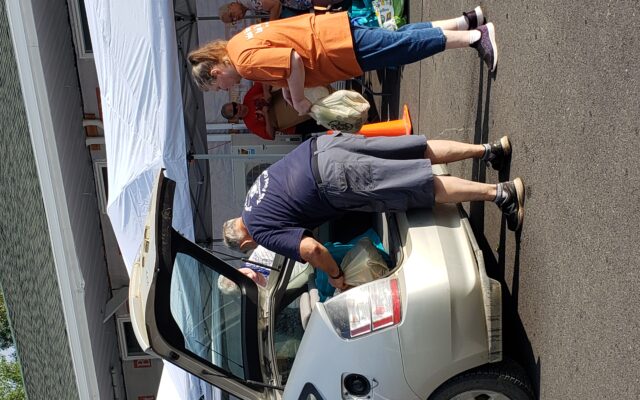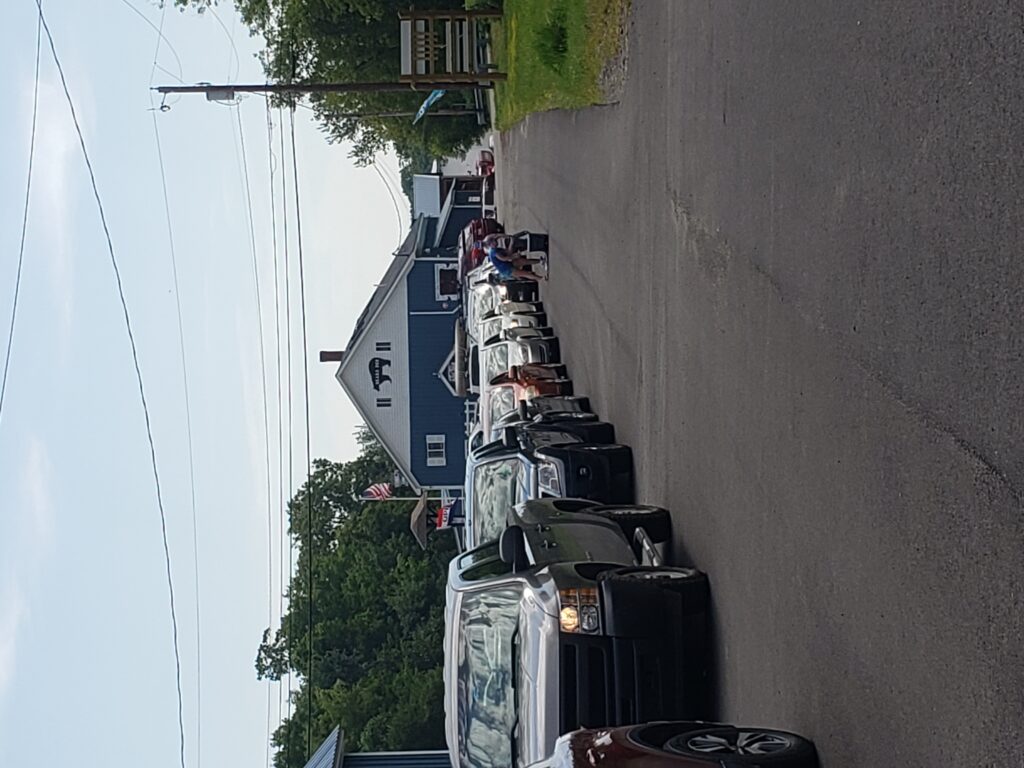
More working families are visiting food pantries in Maine’s poorest county
Piscataquis County’s food pantries are seeing an influx of new people as rising food and fuel costs have some Mainers seeking help for the first time.
Some people have also spent or are no longer receiving pandemic support from employers, said Jenny Jones, Good Shepherd Food Bank’s community resource representative for eastern and northern Maine. Wages remain the same, and the dollar just doesn’t go as far as it once did, she said.
Food pantries in Piscataquis, the poorest and one of the most rural counties in Maine, have always served large numbers of elderly and disabled residents, said Kelly Sirimoglu, Piscataquis Regional Food Center executive director. Now the number of visitors to food pantries is growing, particularly working families struggling to make ends meet.
“We are back up to levels at the height of the pandemic,” Sirimoglu told Piscataquis County commissioners during a meeting Tuesday.

DISTRIBUTING FOOD — Dover-Foxcroft Area Food Cupboard volunteers distribute food to those in need on Aug. 4.
The Piscataquis Regional Food Center in Dover-Foxcroft receives supplies from Good Shepherd Food Bank each week and distributes it to 15 agencies in Piscataquis County, along with Corinna, Dexter and Newport in neighboring Penobscot County.
The organization also partners with Heart of Maine Resource Center for monthly food distribution in Dexter and offers a FarmShare program that delivers seasonal produce to seniors who can’t leave their homes, among other efforts.
Good Shepherd Food Bank projected that Piscataquis County would reach 3,030 food-insecure residents in 2021, or 18 percent of the county’s population, according to data from the organization. Food insecurity among children was projected to reach 27 percent, or a 6 percent increase compared to 2019.
The food bank’s 2021 annual report doesn’t provide food insecurity statistics by county.
In 2020, there were 2,560 people facing food insecurity in Pisctaquis, or 15.2 percent of the population, according to Feeding America’s most recent Map the Meal Gap study.
Sirimoglu, who began leading the Food Center in March, received a call last week from a Piscataquis County teenager on the verge of tears because there was nothing to eat at home, she said.

WAITING FOR FOOD — A long line of cars waits for food to be distrbuted by the Dover-Foxcroft Area Food Cupboard on July 21.
“[The teenager] was breaking up and almost crying,” she said. “We’re seeing more of that — people who never thought they would need assistance.”
Although it wasn’t a typical distribution day, the small family came in later that afternoon for a box of items, including chicken and fresh produce.
The amount of food delivered each week to the Food Center varies depending on how much food agencies — including pantries, churches and schools — have ordered. One week it could be 13 to 15 pallets of food, and the next might be 35, Sirimoglu said.
At Dyer’s Hope House in Milo, which serves about 120 people each month, new clients are up about 30 percent compared to last year, General Manager John Cram said. The pantry saw a jump in visitors in late spring of this year, he said.
Demographics of new clients are spread out, but more large families with young children are seeking support. The pantry also delivers to those with mobility issues or without transportation.
“We’re hearing from more people who can’t get out,” he said. “They don’t have a vehicle or they can’t afford fuel. They’re at their end, so they call us.”
The food pantry at Greenville’s American Legion is seeing fewer people as the COVID-19 pandemic has evolved, but there are certainly new faces, Commander Pete Johnson said. Sometimes people contact the town office for assistance and are then referred to the legion.
Good Shepherd Food Bank supplies food to the Dover-Foxcroft Area Food Cupboard — which is separate but shares space with the Food Center at 76 North St. — Dyer’s Hope House in Milo, First Universalist Church Pantry in Sangerville and Partnership Food Pantry in Greenville and Guilford, Jones said.
Jones — who provides support to agencies in Piscataquis, Penobscot, Aroostook, Hancock and Washington counties — said partners report the number of families served each month, usually on a quarterly basis, which always fluctuates. In Washington and Hancock counties, for example, the increase in visitors to food pantries is most prevalent in heavily populated pockets, she said.
Some partner agencies have reported a shift in pantry visitors’ demographics. It’s more common to see middle-class families rather than only those living in poverty, she said.
Living in Piscataquis also comes with the extra challenge of geography. Not every community has a food pantry, meaning those in need must travel to receive assistance. This can be difficult without reliable transportation.
“Piscataquis has very complex issues that we’re wrestling with — addiction, child care issues, poverty, disability and hunger,” Sirimoglu said. “We have some of the highest rates of depression among kids. There’s a feeling of hopelessness among children in our area.”
And children cannot learn or see what’s in front of them when their stomachs are empty and growling, she said.
Sirimoglu also worries about the number of disbled seniors and veterans living alone in off-the-grid locations. They are often isolated without transportation or internet, and it’s difficult to know how many are falling through the cracks.
The Food Center regularly delivers to 50-60 of those people, sometimes bringing romance novels and puzzles to bring some comfort, Sirimoglu said. Sometimes the delivery person is the only interaction that they’ll have on a given week.
“In an area without mass transit and greater broadband access, there are people who could be taking advantage of assistance and are missing it right now,” she said.
The Piscataquis Regional Food Center accepts food donations at 76 North St., Dover-Foxcroft, during business hours on Monday, Wednesday and Friday. Donations can be made online. The center is also seeking volunteers.